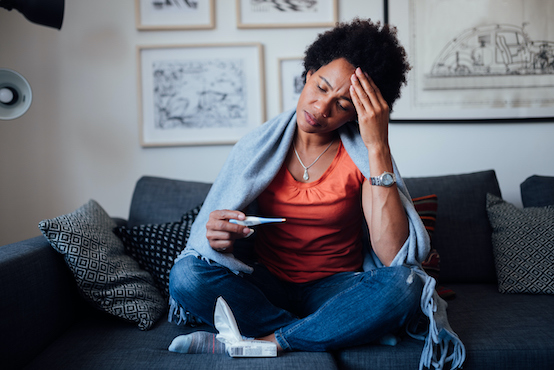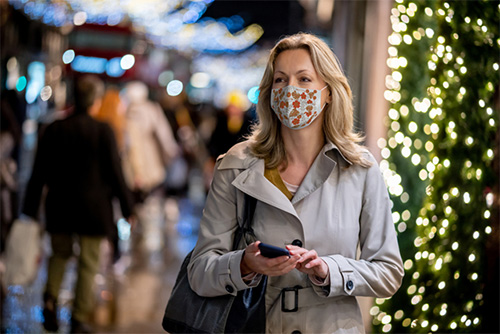The Omicron variant is highly contagious, hospitals are overwhelmed, and for now your doctor wants you to ride out your case of Covid at home. Are you prepared for what comes next?
The good news: If you’re being told to stay put rather than head to the hospital, you might be on track to have a mild or moderate case of the virus. The not-so-good news: Dealing with Covid at any level is stressful and tricky, especially if you have added health concerns or need to shield others in your household from getting very sick.
Your goal right now is to get to the other side of Omicron. Here are seven things that can help along the way.

1. Get tested to confirm Covid-19
Don’t just guess that you have Covid — or assume that you don’t! Getting tested to confirm or rule out Covid is important for several reasons:
- Classic symptoms of Covid-19 often mimic and overlap with cold and flu virus symptoms. New! Symptoms of Omicron are slightly different than Delta. Prominent signs that you have Omicron include cough, fatigue or tiredness, congestion and runny nose. Unlike in previous variants, the loss of taste and smell seems to be uncommon
- Without a test, you don’t know if you’re so much a danger to others — or in so much danger yourself.
- A positive Covid test tells you how long you must isolate. A Covid test starts the clock ticking. According to CDC guidelines, asymptomatic people still need to isolate for 10 days after a positive test to avoid spreading the virus to others.
- Getting tested helps your community. Decisions about masks and other Covid measures are largely made based on level of community spread. Having accurate data is critical. Getting tested also helps contact tracing of your close contacts.
2. Stay in touch with your body
Covid may begin as a respiratory infection, but getting sick with the virus can affect the entire body. To monitor your health, check in every day with how you’re feeling and note any symptoms or changes that seem new or different. It’s helpful to record these in a journal. Signs to watch for include:
Temperature.
A moderate fever spike is a sign your immune system is doing its job. A high temperature that’s accompanied by chills, fatigue and uncontrolled shaking, however, could be a sign of a cytokine storm. Ask your doctor to give you a high temperature threshold for seeking help. Generally, this is 103 degrees or higher for most people, but it can differ depending on age and other underlying health conditions.
Changes in blood oxygen levels.
As Covid attacks the lungs, it can decrease the amount of oxygen that ends up in the bloodstream. One simple way to keep track of blood oxygenation is to use a pulse oximeter. This simple and relatively inexpensive device can be a helpful tool for catching low oxygen levels early, especially since oxygenation levels can dip into dangerous territory with Covid-19 without the usual obvious signs. The Chicago Tribune has a good article comparing different models. New! There is evidence that Omicron may damage the lungs less than Delta and other variants. However, with so much still unknown about Omicron, it’s remains a good idea to monitor oxygen levels.
Changes in your breathing.
Spend a few minutes each day listening to your breathing. Gasping breaths or longer inhales and shorter exhales should get you curious about checking your blood oxygen levels. To breathe easier, you may want to try proning, which entails laying on your stomach in bed. Proning is a medically accepted position to improve breathing comfort and oxygenation for people with Covid. If your oxygenation is poor, try proning for an hour or more several times a day. You can use pillows and rolled towels to make this position more comfortable. If breathing ever becomes difficult, get prompt medical attention.
Color of your urine.
If your urine is darker than usual, it’s a sign that you are dehydrated and should increase fluid intake. Staying hydrated when you are sick thins mucus secretions and helps organs function better.
Swelling and redness in your legs.
Risk for blood clots can increase when you’re sick and spending a lot of time in bed so check your legs every day for swelling, redness and hot spots that could indicate blood clots. You can help your circulation with simple exercises like flexing and pointing your toes.
Monitor your alkalinity and take steps to alkalize.
There’s plenty of evidence that alkalinity helps your immune system fight viruses. You can monitor yours with simple pH strips. For tips on increasing your alkalinity, read more here.
3. If you think you need help, seek it
Covid symptoms can become more severe, sometimes with little warning. Call your doctor when you need help or notice a troubling change. One good rule of thumb to follow? If anything has you debating whether or not to go to the hospital, you probably should go. If you don’t already have a primary care physician — many American’s don’t — line one up now so you aren’t making this decision under too much stress.
4. Tweak your diet and your supplements to support healthy immune function
Chicken soup should definitely be on the menu as should other anti-inflammatory foods that promote respiratory health.
Supplements can also help support healthy immune function. Useful supplements include:
Vitamin C and zinc — to help repair immune function.
Vitamin D and melatonin — for healthy immune function and immune regulation.
Omega-3 fatty acids — for anti-inflammatory support.
Magnesium — for support related to muscle relaxation, which can help reduce pain.
B vitamins — for energy support.
We also recommend a high quality multivitamin or targeted immune support supplements. Nourishing your body during Covid also helps your activated immune response to return to normal after your body defeats the virus.
5. Give yourself recovery time
When you’re sick and exhausted, it sets the stage for opportunistic infections like pneumonia. Pneumococcal bacteria is everywhere, including around the home (it’s not just in hospitals). Taking good care of yourself when you are sick makes it easier to bounce back post-Covid. So, for now, do your best to be a good patient and prioritize rest.
6. Don’t catastrophize your situation
Catastrophic thinking is a learned cognitive bias in which our brains start to select and highlight facts that confirm a certain fear, and ignore those that contradict it. After living in fear of Covid for over 20 months, all that bottled up worry and anxiety can make you forget the fact that the vast majority of people who get sick with Covid recover from it.
Stress dampens immune function and catastrophic thinking just adds to your stress burden. Your immune system is already being overworked, so if you have a severe stress reaction to your situation, it can suppress your immune function, making it harder for your body to extinguish the viral infection. If you have a pre-existing condition, you are already stressed; more stress just puts immune function at even greater risk.
How do you keep Covid in perspective? When your mind starts racing with scary Covid statistics, consciously challenge these stress-inducing thoughts. When they come up, literally say out loud, “Stop!” or “No more!” Follow up with a stress relief technique like deep breathing to help you let go of fears and refocus your thoughts. Keep doing this until it becomes habit.
7. Stay physically isolated — but emotionally connected
If you live with others but one of you is riding out Covid at home, isolate the infected person to reduce the chances for spreading illness. Use a separate bedroom or establish a “sick room” in a different part of the house. Use a separate bathroom too, if possible. If you do need to use a shared space, like the kitchen, make sure the room has good air circulation. You can text your family that you need to use the kitchen or bathroom to give them a heads up to clear out (and open the window). Remember, virtually all Covid is spread via airborne infection, not by contact. You can take turns using a space if it’s well-ventilated and you take normal precautions.
Technology also helps with avoiding the emotional isolation of being sick. Staying in touch with friends and family through texts, emails and funny memes shared on social media can lift your spirits and let you know that you are not alone in this. Your friends and family may not know the level of engagement you’re up for, so make it clear to loved ones that staying connected virtually is something you want.
Don’t have Omicron…yet? Take our new Immune Health Quiz to find out how to support your immune system health, so it can protect you!









